Related Research Articles

Saddam Hussein Abd al-Majid al-Tikriti, was an Iraqi politician and revolutionary who served as the fifth president of Iraq from 1979 to 2003. He also served as prime minister of Iraq from 1979 to 1991 and later from 1994 to 2003. He was a leading member of the revolutionary Arab Socialist Ba'ath Party, and later, the Baghdad-based Ba'ath Party and its regional organization, the Iraqi Ba'ath Party, which espoused Ba'athism, a mix of Arab nationalism and Arab socialism.
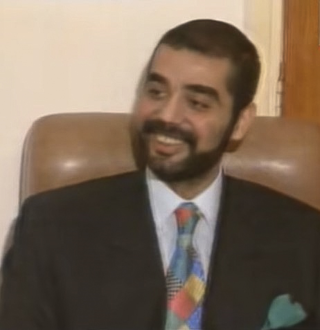
Uday Saddam Hussein was an Iraqi politician and the elder son of Saddam Hussein. He held numerous positions as a sports chairman, military officer and businessman, and was the head of the Iraqi Olympic Committee and Iraq Football Association, and head of the Fedayeen Saddam.
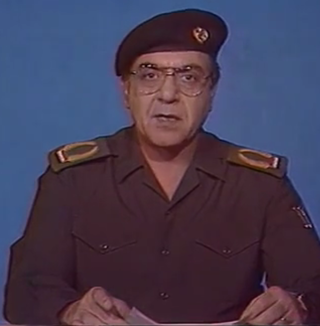
Mohammed Saeed al-Sahhaf is an Iraqi former diplomat and politician. He served as Minister of Foreign Affairs from 1992 to 2001. He came to worldwide prominence around the 2003 invasion of Iraq, during which he was the Minister of Information under Iraqi President Saddam Hussein, acting as spokesman for the Arab Socialist Ba'ath Party and Saddam's government. He has also been nicknamed Baghdad Bob or Comical Ali for his notable and colorful television appearances as the Information Minister of Iraq.

The Battle of Baghdad, also known as the Fall of Baghdad, was a military engagement that took place in Baghdad in early April 2003, as part of the invasion of Iraq.
Hikmat Mizban Ibrahim al-Azzawi was an Iraqi politician who was a Deputy Prime Minister and twice Minister of Finance under the government of Saddam Hussein.
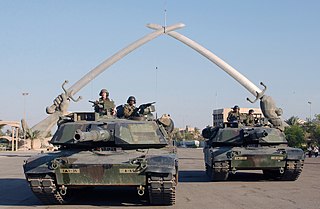
The following is a timeline of major events during the Iraq War, following the 2003 invasion of Iraq.

Hillah, also spelled Hilla, is a city in central Iraq on the Hilla branch of the Euphrates River, 100 km (62 mi) south of Baghdad. The population was estimated to be about 455,700 in 2018. It is the capital of Babylon Province and is located adjacent to the ancient city of Babylon, and close to the ancient cities of Borsippa and Kish. It is situated in a predominantly agricultural region which is extensively irrigated with water provided by the Hilla canal, producing a wide range of crops, fruit and textiles. Its name may be derived from the word "beauty" in Arabic. The river runs exactly in the middle of the town, and it is surrounded by date palm trees and other forms of arid vegetation, reducing the harmful effects of dust and desert wind.
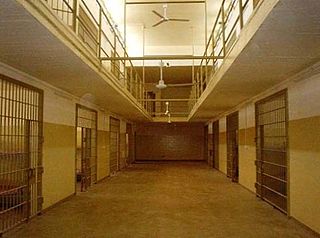
Abu Ghraib prison was a prison complex in Abu Ghraib, Iraq, located 32 kilometers (20 mi) west of Baghdad. Abu Ghraib prison was opened in the 1950s and served as a maximum-security prison. From the 1970s, the prison was used by Saddam Hussein to hold political prisoners and later the United States to hold Iraqi prisoners. It developed a reputation for torture and extrajudicial killing, and was closed in 2014.
Farzad Bazoft was an Iranian journalist who settled in the United Kingdom in the mid-1970s. He worked as a freelance reporter for The Observer. He was arrested by Iraqi authorities and executed in 1990 after being convicted of spying for Israel while working in Iraq.
Events in the year 2005 in Iraq.

The trial of Saddam Hussein was the trial of the deposed President of Iraq Saddam Hussein by the Iraqi Interim Government for crimes against humanity during his time in office.
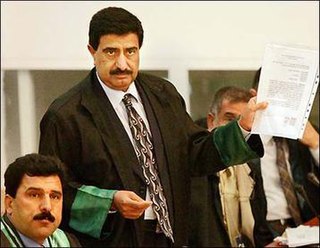
Khamis al-Obeidi was a lawyer defending Saddam Hussein and Barzan Ibrahim al-Tikriti, from the time the former leader's trial began in Baghdad on October 19, 2005, until his assassination. He was a Sunni Muslim, was married and had three children.

Al-Mansour is one of the nine administrative districts in Baghdad, Iraq. It is in western Baghdad and is bounded on the east by al-Karkh district in central Baghdad, to the north by Kadhimiya, to the west by Baghdad International Airport, and to the south by Baghdad Airport Road, on the other side of which is al-Rashid district.
The cinema of Iraq went through a downturn under Saddam Hussein's regime. The development of film and film-going in Iraq reflects the drastic historical shifts that Iraq has experienced in the 20th century. The Iraq War which began in 2003 had an influence on many films being produced.

House of Saddam is a 2008 British docudrama television miniseries that charted the rise and fall of Saddam Hussein. A co-production between BBC Television and HBO Films, the series was first broadcast on BBC Two in four parts between 30 July and 20 August 2008.

The interrogation of Saddam Hussein began shortly after his capture by U.S. forces in December 2003, while the deposed president of Iraq was held at the Camp Cropper detention facility at Baghdad International Airport. Beginning in February 2004, the interrogation program, codenamed Operation Desert Spider, was controlled by Federal Bureau of Investigation (FBI) agents. Standard FBI FD-302 forms filed at the time were declassified and released in 2009 under a U.S. Freedom of Information Act request filed by the National Security Archive. Saddam, identified as "High Value Detainee #1" in the documents, was the subject of 20 "formal interviews" followed by five "casual conversations." Questioning covered the span of Saddam's political career, from 2003 when he was found hiding in a "spider hole" on a farm near his home town of Tikrit, back to his role in a failed 1959 coup attempt in Iraq, after which he had taken refuge in the very same place, one report noted.

General Aziz Al-Yasiri was the Secretary General of the Iraqi Democratic Current.

Tourism in Iraq refers to tourism in the Western Asian country Iraq. Iraq was one of the main destinations for many years, however it changed dramatically due to conflicts. The tourism in Iraq has faced many challenges, however, in recent years there has been improvements. The capital city Baghdad is the second largest city in the Arab world and the 4th largest in the Middle East. Iraq has several World Heritage Sites, dating back to ancient Mesopotamia, most notably Babylon Iraq. Iraq is considered to be a potential location for ecotourism. Erbil was chosen as "Arab Tourism Capital" in 2014 by the Arab Tourism Committee.
Reactions to the execution of Saddam Hussein were varied. Some strongly supported the execution, particularly those personally affected by Saddam's actions as leader. Some of these victims wished to see him brought to trial for his other actions, alleged to have resulted in a much greater number of deaths than those for which he was convicted. Some believed the execution would boost morale in Iraq, while others feared it would incite further violence. Many in the international community supported Saddam being brought to justice but objected in particular to the use of capital punishment. Saddam's supporters condemned the action as unjust.
References
- ↑ Makiya, Kanan (1998). Republic of Fear: The Politics of Modern Iraq . University of California Press. pp. 7. ISBN 0520214390.
- ↑ Juman, Kubba (2003). The First Evidence : A Memoir of Life in Iraq under Saddam Hussein. London: McFarland. pp. 30–49. ISBN 0786415800.
- 1 2 3 4 5 6 Kubba, J. (2003). The first evidence: A memoir of life in Iraq under Saddam Hussein. Jefferson, N.C: McFarland & Co.
- 1 2 3 4 Al Saadi, M. (2014). A Doctor From Mesopotamia. United Kingdom: Author House.
- 1 2 3 4 5 6 7 8 Police stations in the history of Iraq: read in the file of crimes, "Abu Tabar" after 40 years. (2013, December 03). Retrieved August 11, 2014, from Algardenia: http://www.algardenia.com/2014-04-04-19-52-20/menouats/8152-40.html